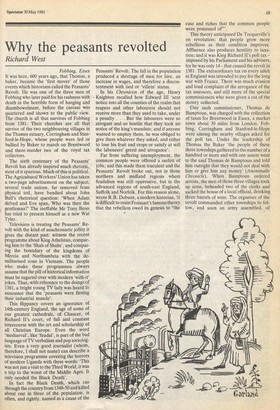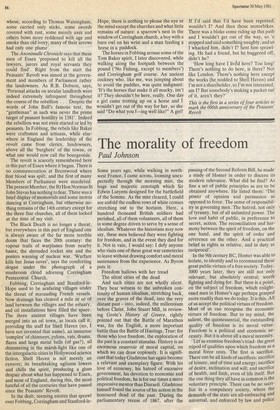Why the peasants revolted
Richard West
Fobbing, Essex It was here, 600 years ago, that Thomas, a baker, became the 'first mover' of those events which historians called the Peasants' Revolt. He was one of the three men of Fobbing who later paid for his rashness with death in the horrible form of hanging and disembowelment, before the carcase was quartered and shown to the public view. The church is all that survives of Fobbing from 1381. Their churches are all that survive of the two neighbouring villages in the Thames estuary, Corringham and Stanford-le-Hope, whose people were led or bullied by Baker to march on Brentwood and there murder two of the royal tax collectors.
The sixth centenary of the Peasants' Revolt has already inspired much rhetoric, most of it spurious. Much of this is political. The Agricultural Workers' Union has taken a two-page advertisement on the subject; several trade unions, far removed from physical toil, have bandied about John Bull's rhetorical question: 'When Adam delved and Eve span, Who was then the gentleman?' The ineffable Mr Tony Benn has tried to present himself as a new Wat Tyler.
Television is treating the Peasants' Revolt with the kind of anachronistic jollity it gives the distant past: witness the recent programme about King Athelstan, comparing him to the 'Shah of Shahs', and comparing the boundary of the kingdoms of Mercia and Northumbria with the demilitarised zone in Vietnam. The people who make these programmes always assume that the pill of historical information must be sugared over with modern `with-if jokes. Thus, with reference to the doings of 1381, a bright young TV lady was beard to announce that the 'peasants were flexing their industrial muscle'.
This flippancy covers an ignorance of 14th-century England, the age of some of our greatest cathedrals, of Chaucer, of Richard II's court, of full and constant intercourse with the art and scholarship of all Christian Europe. Even the word 'mediaeval', like 'feudal', is part of the bad language of TV verbalism and pop sociologists. Even a very good journalist (whom, therefore, I shall not name) can describe a television programme covering the horrors of modern Uganda with these words: 'This was not just a visit to the Third World, it was a trip to the worst of the Middle Ages. It only needed the Black Death'. In fact the Black Death, which ran through the country from 1348-50 and killed about one in three of the population, is often, and rightly, named as a cause of the Peasants' Revolt. The fall in the population produced a shortage of men for hire, an increase in wages, and therefore a discontentment with tied or 'villein' status.
In his Chronicon of the age, Henry • Knighton recalled how Edward HI 'sent notice into all the counties of the realm that reapers and other labourers should not receive more than they used to take, under a penalty . . . But the labourers were so arrogant and so hostile that they took no notice of the king's mandate; and if anyone wanted to employ them, he was obliged to give them whatever they asked, and either to lose his fruit and crops or satisfy at will the labourers' greed and arrogance'.
Far from suffering unemployment, the common people were offered a surfeit of jobs; and this made them truculent and the Peasants' Revolt broke out, not in those northern and midland regions where feudalism was still oppressive, but in the advanced regions of south-east England, Suffolk and Norfolk. For this reason alone, wrote R.B. Dobson, a modern historian, 'it is difficult to resist Froissart's famous theory that the rebellion owed its genesis to "the ease and riches that the common people were possessed of".
This theory anticipated De Tocqueville's on revolution: that people grow more rebellious as their condition improves. Affluence also produces hostility to taxation; and it was King Richard II's poll tax — imposed by his Parliament and his advisers, for he was only 14 that caused the revolt in 1381. The extraordinary tax on every adult in England was intended to pay for the long war with France. There was much evasion and loud complaint of the arrogance of the tax assessors, and still more of the special commissioners who were given a cut of the money collected.
One such commissioner, Thomas de Bamptoun, was charged with the collection of taxes for Brentwood in Essex, a market town about 30 miles from London. Fobbing, Corringham and Stanford-le-Hope were among the nearby villages asked for the poll tax. Under the leadership of Thomas the Baker 'the people of these three townships gathered to the number of a hundred or more and with one assent went to the said Thomas de Bamptoun and told him outright that they would not deal with him or give him any money' (Anonirnalle Chronicle). When Bamptoun ordered arrests, the men of those three villages took up arms, beheaded two of the clerks and sacked the house of a local official, drinking three barrels of wine. The organiser of the revolt commanded other townships to follow, and soon an army assembled, of whom, according to Thomas Walsingham, some carried only sticks, some swords covered with rust, some merely axes and others bows more reddened with age and smoke than old ivory; many of their arrows had only one plume'.
The Anonimalle Chronicle says that these men of Essex 'proposed to kill all the lawyers, jurors and royal servants they could find'. Right from the start the Peasants' Revolt was aimed at the government and members of Parliament rather the landowners. As R.B. Dobson, says, 'Personal attacks on secular landlords were indeed extremely infrequent throughout the course of the rebellion . . . Despite the words of John Ball's famous text, the "gentleman" as such was never the prime target of peasant hostility in 1381'. Indeed the rebellion was not even started or led by peasants. In Fobbing, the rebels like Baker were craftsmen and artisans, while elsewhere in England the leadership of the revolt came from clerics, landowners, above all the 'burghers' of the towns, or what one would now call the bourgeoisie.
The revolt is scarcely remembered here in this part of Essex where it began. There is no commemoration at Brentwood where first blood was spilt, and the first of many Members of Parliament were murdered. The present Member, the Rt Hon Norman St John Stevas has nothing to fear. There was a brief display of memorials and some morris dancing at Corringham, but otherwise nothing remains of the 14th century except for the three fine churches, all of them locked at the time of my visit.
The Black Death is no longer a threat, but everywhere in this part of England one is always aware of the far more terrible doom that faces the 20th century: the vapour trails of warplanes from nearby bases; the shrouded rocket site and the posters warning of nuclear war. 'Warfare kills but Jesus saves', says the comforting slogan under the photograph of a mushroom cloud adorning Corringham Pentecostal Church.
Fobbing, Corringham and Stanford-leHope used to be seafaring villages under the threat of marauding French vessels. Now drainage has cleared a mile or so of land between the villages and the estuary, and oil installations have filled the space. The three ancient villages have been merged into an oil town, as locals call it, providing the staff for Shell Haven (no, I have not invented that name), an immense 'complex' of chimneys, pylons, vats, drums, flares and large metal balls (of gas?), all shimmering in the marsh-light like one of the intergalactic cities in Hollywood science fiction. Shell Haven is not merely an eyesore; its breathtaking ugliness lowers and chills the spirit, producing a glum despair about what has happened to Essex, and most of England, during this, the most hateful of all the centuries that have passed since the Peasants' Revolt.
In the drab, teeming estates that sprawl over Fobbing, Corringham and Stanford-le Hope, there is nothing to please the eye or the mind except the churches and what little remains of nature: a sparrow's nest in the window of Corringham church, a boy with a barn owl on his wrist and a man feeding a horse in a paddock.
The horses in Fobbing arouse some of the Tom Baker spirit, I later discovered, while walking along the footpath between the pound (`No Fishing, except to members') and Corringham golf course. An ancient cockney who, like me, was jumping about to avoid the puddles, was quite indignant: 'It's the horses that make it all mucky, isn't it? They shouldn't be here, really. One day a girl came trotting up on a horse and I wouldn't get out of the way for her, so she said "Do what you f---ing well like!" A girl! If I'd said that I'd have been reported, wouldn't I? And then those motorbikes. There was a bloke come riding up this path and I 'wouldn't get out of the way, so 'e stopped and said something naughty, and so I whacked him, didn't I? Sent him sprawling. He had a friend, but he buggered off, didn't he?
'How long have I livtd here? Too long! There's nothing to do here, is there? Not like London. There's nothing here except the works (he nodded to Shell Haven) and I'm not a shareholder, so I'm not interested, am I? But somebody's making a packet out of it, aren't they?'
This is the first in a series of four articles to mark the 600th anniversary of the Peasants' Revolt











































 Previous page
Previous page